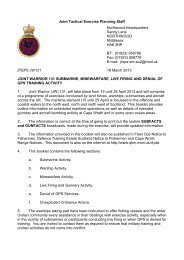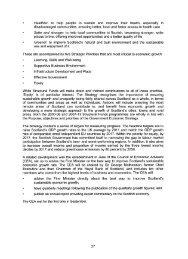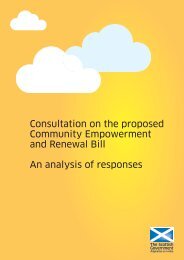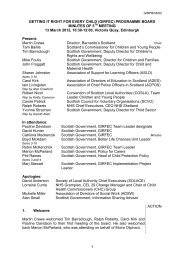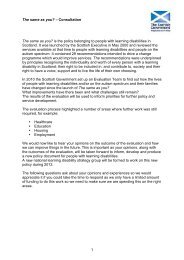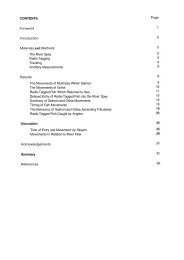Residential Mobile Homes in Scotland - Scottish Government
Residential Mobile Homes in Scotland - Scottish Government
Residential Mobile Homes in Scotland - Scottish Government
You also want an ePaper? Increase the reach of your titles
YUMPU automatically turns print PDFs into web optimized ePapers that Google loves.
2.60 A high proportion of mobile homes were owned by their residents (78 per cent).<br />
<strong>Mobile</strong> home residents tended to be older than their counterparts <strong>in</strong> the other two case study<br />
areas, and a greater proportion also had long term limit<strong>in</strong>g illnesses. However, the majority<br />
of residents had central heat<strong>in</strong>g.<br />
Conclusions<br />
2.61 A dist<strong>in</strong>ctive feature of mobile homes <strong>in</strong> <strong>Scotland</strong> was the relatively high proportion<br />
of tenants who rented their homes from private landlords compared with the situation <strong>in</strong><br />
England and Wales. The 2001 Census showed that just over a third of all mobile home<br />
residents <strong>in</strong> <strong>Scotland</strong> were tenants of private landlords, whilst the respective figure <strong>in</strong><br />
England and Wales was about one fifth. While recent changes to the legislation cover<strong>in</strong>g<br />
mobile homes <strong>in</strong> the Hous<strong>in</strong>g (<strong>Scotland</strong>) Act 2006 were aimed at people who owned their<br />
home and rented the stance from site owners, there were concerns that this legislation fails to<br />
address the needs of people who rent their homes and who do not live on licensed sites<br />
(<strong>Scottish</strong> Parliament, 2005).<br />
2.62 The Census showed that caravans, mobile homes and other temporary structures were<br />
play<strong>in</strong>g a particular role <strong>in</strong> the hous<strong>in</strong>g system <strong>in</strong> terms of provid<strong>in</strong>g accommodation for older<br />
people, and also for people with a long term limit<strong>in</strong>g illness. Thus, mobile homes were a<br />
more important form of accommodation for potentially vulnerable households than the<br />
general population. One conclusion to draw is that, whilst the sector is numerically small <strong>in</strong><br />
number, the characteristics of people who live <strong>in</strong> the mobile home sector means that there is a<br />
greater onus on authorities to ensure that the <strong>in</strong>tended outcomes of legislation are both<br />
monitored and enforced.<br />
2.63 A diverse range of sources can be used to build up a picture of <strong>in</strong>dividual mobile<br />
homes. Both the 2001 Census and the Valuation Roll provide data on the <strong>in</strong>cidence of<br />
<strong>in</strong>dividual units. These sources of data can be supplemented at local level through<br />
discussions with local people to derive an estimate of numbers, and also an <strong>in</strong>dication of the<br />
type of households who are occupy<strong>in</strong>g mobile homes. A possible source of <strong>in</strong>formation at<br />
local level is the use of hous<strong>in</strong>g needs surveys. However, the experience of agencies shows<br />
that considerable effort is required to uncover the total number of residents liv<strong>in</strong>g <strong>in</strong> mobile<br />
homes, who are often hidden away and difficult to identify. The <strong>in</strong>formation on <strong>in</strong>dividual<br />
mobile homes reiterated the conclusions of earlier research that this type of accommodation<br />
plays a small, but crucial, role <strong>in</strong> local hous<strong>in</strong>g markets <strong>in</strong> many remote and rural areas. In<br />
this respect, <strong>in</strong>dividual mobile homes are a strong characteristic feature of mobile home<br />
liv<strong>in</strong>g <strong>in</strong> <strong>Scotland</strong>.<br />
31



